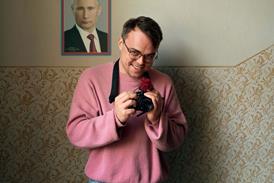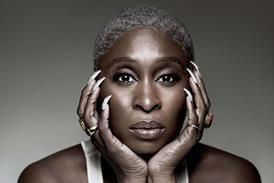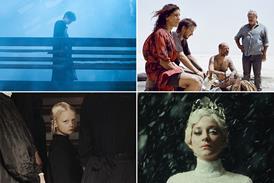Dir. Babak Anvari. UK, Jordan, Qatar. 2016. 83mins.
The Tehran 1988 backdrop, with the rumbling discord of the post Revolution era and the Iran-Iraq war, brings a potent sense of threat to effective supernatural thriller Under The Shadow. The prickly mother-daughter dynamic and the atmospheric use of architecture evoke films like Jennifer Kent’s The Babadook and Hideo Nakata’s Dark Water, but the culturally specific elements that Iran-born, British-based first time writer-director Babak Anvari brings to the picture makes this a distinctive spin on a familiar premise.
What’s particularly interesting is the use of the veil as a symbol of the threat which haunts Shideh and her daughter
The film, which premieres in the Sundance Midnight section, seems assured of plenty of festival interest. The success of the Iranian vampire movie A Girl Walks Home Alone At Night may have already prepared audiences for the idea of Persian-language genre cinema, but with that in mind, theatrical prospects will most likely lie within the arthouse niche rather than with wider horror audiences. Netflix stepped in prior to its Sundance debut to take streaming rights, with Vertical Entertainment and XYZ Films partnering for global day-and-date release on digital and VOD. There will be a theatrical release in select sites.
Narges Rashidi gives an intriguingly abrasive, angular performance as Shideh, mother of a young daughter, Dorsa (Avin Manshadi) and wife of Iraj (Bobby Naderi), a doctor with whom she studied at university. Shideh’s own medical career has been permanently curtailed, we learn at the film’s opening, as a result of her left-wing political affiliations and activities during the revolution. As a result, Shideh tends to be impatient and short-tempered with her husband and daughter.
When Iraj is sent to do military service in the heart of the combat, he urges Shideh to leave Tehran for the comparative safety of his parent’s home in the north of the country. She refuses curtly, preferring to stay in the family home, a flat in an apartment block in Tehran’s suburbs. Shortly after Iraj leaves however, the roof is hit by an Iraqi missile which fails to explode but delivers an sinister payload into the building.
Shideh has no time for her superstitious neighbour’s talk of djinns, but as her daughter becomes increasingly distraught and Shideh’s own sleep is disturbed by vivid dreams of intruders in her home, her sense of reality starts to fray.
Under The Shadow’s sound design leaves us with no doubt that the threat is real. A low seismic grumble of disquiet evolves into a desolate howling wind; overlaid on top is a continual babble of hectoring official voices nagging from the radio and television. After the missile strike, once the other residents of the block have left, Shideh listens uneasily to the groans of the building’s damaged infrastructure.
The film is not without its clichéd tropes. Dorsa’s slightly creepy ragdoll becomes a central motif – somewhat implausibly, Shideh agrees to postpone the journey to her parents-in-law and safety when the doll goes missing.
What’s particularly interesting, however, is the use of the veil as a symbol of the threat which haunts Shideh and her daughter. A modern woman, who exercises to a Jane Fonda workout video every morning, Shideh is a product of the liberated pre-revolution era in which she grew up. When, panicking about a presence in the apartment, she flees the building without her hijab, she is arrested and warned of a punishment of lashes. And when the djinn finally materialises, it is a faceless shape wrapped in a sweeping chador, which threatens to engulf the terrified mother and daughter.
Production company: Wigwam Films
International sales: XYZ Films nate@xyzfilms.com
Producers: Lucan Toh, Emily Leo, Oliver Roskill
Screenplay: Babak Anvari
Cinematography: Kit Fraser
Editor: Chris Barwell
Production design: Nasser Zoubi
Main cast: Narges Rashidi, Avin Manshadi, Bobby Naderi, Ray Haratian, Soussan Farrokhnia





















